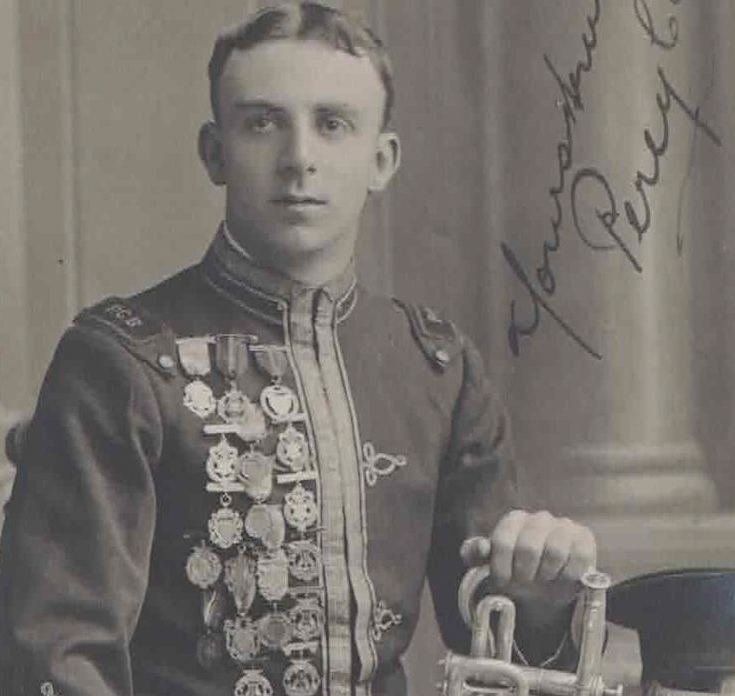
Percy Code as a young cornet star
13. Percy Code (1888 – 1953)
For a musician of such extensive talents it seems cruel that to a 21st century banding world, Percy Edward Code is primarily recognised as the composer of an iconic cornet solo.
‘Zelda’, written in 1923, became the showpiece of Paul Stender, the pre-eminent Australian cornet player of the era – gaining lasting popularity when he performed it at concerts with the Newcastle Steelworks Band on their famous British Open winning trip to Britain in 1924.
A caprice of delicacy and waspishness, it has remained a core solo standard of cornet player ever since.
That alone though is but a minor part of Percy Code’s musical legacy.
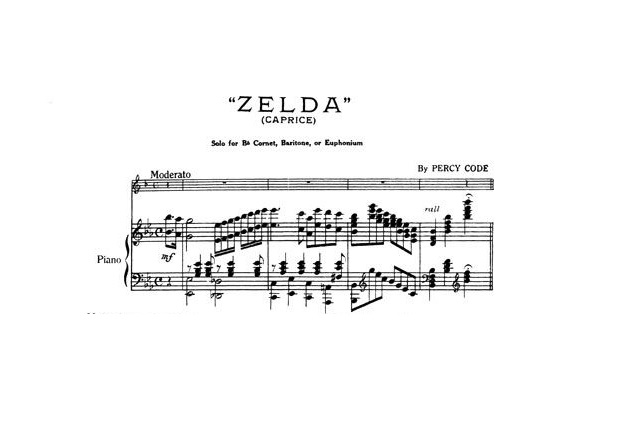
Serious countenance
Why his name isn’t emblazoned on the wider brass band consciousness, such as Frank Wright (who he taught as a youngster when both lived in Ballarat), was perhaps due to his own personality.
The Australian Dictionary of Biography noted that he was “short, solid and somewhat colourless”.
That would be unfair, although almost 70 years after his death there is a sense of modesty that seeps through the few historical images of him: Serious and professional, dark eyes deeply set in a saturnine face, a countenance of purpose moulded as a studious child who excelled at violin, piano and cornet.
Anything but capricious
Unlike the virtuosic Stender in performance or the domineering Wright in personality, (who would later win the Australian Cornet Championship performing Code’s 1919 work ‘Wendouree’, before going on to become one of the foremost banding figures in the years after his death), he was anything but capricious.
That would be unfair, although almost 70 years after his death there is a sense of modesty that seeps through the few historical images of him: Serious and professional, dark eyes deeply set in a saturnine face, a countenance of purpose moulded as a studious child who excelled at violin, piano and cornet.
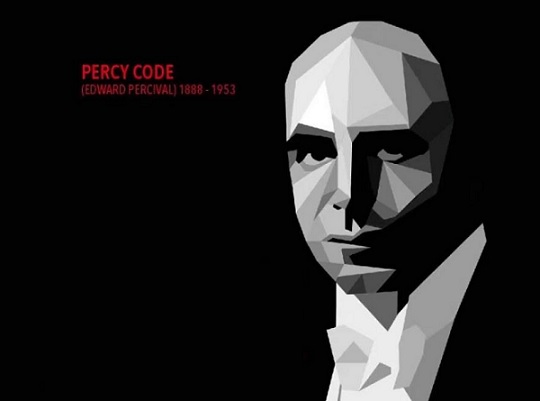
A serious musician
Born into a family of brass band players (and taught by his father) in South Melbourne, by the age of 14 he was marked as a performer of talent by the legendary James Ord Hume.
Winning the prestigious Ballarat soprano cornet title in 1905 and again in 1906, he moved to cornet and won the Blue Riband cornet title in 1910 against 56 competitors.
No one to beat him
The judge, William Short, who was Royal Trumpeter to His Majesty the King, commented that “he had never heard anything like his playing in England.” After the band contest he added: “They had not got one in the Old Country who could beat him”.
The judge, William Short, who was Royal Trumpeter to His Majesty the King, commented that “he had never heard anything like his playing in England.” After the band contest he added: “They had not got one in the Old Country who could beat him”.
The arrival of Besses o’ th’ Barn Band on their second world tour saw Percy Code perform as guest principal cornet – staying as they went on to visit South Africa and returned to England. Whilst there he studied harmony, composition, instrumentation and arranging under Alex Owen and was awarded the title ‘The King’s Trumpeter’ by George V.
In the Old Country he certainly made his mark.
Wonderful command
Playing with Besses in an afternoon concert at Leigh Hippodrome in April 1911 under Owen, Percy performed a duet with trombonist W. Weedall in the afternoon.
The critic waxed lyrical: “He has a wonderful command over the instrument, and is undoubtedly one of the most brilliant solo cornets ever heard in this district”.
He then followed it in the evening by making what the correspondent for the Leigh Chronicle & Weekly District Advertiser called; “a great impression” after he encored his solo ‘Dreams of Love’ with a rendition of ‘The Lost Chord’.
The critic waxed lyrical: “He has a wonderful command over the instrument, and is undoubtedly one of the most brilliant solo cornets ever heard in this district”.
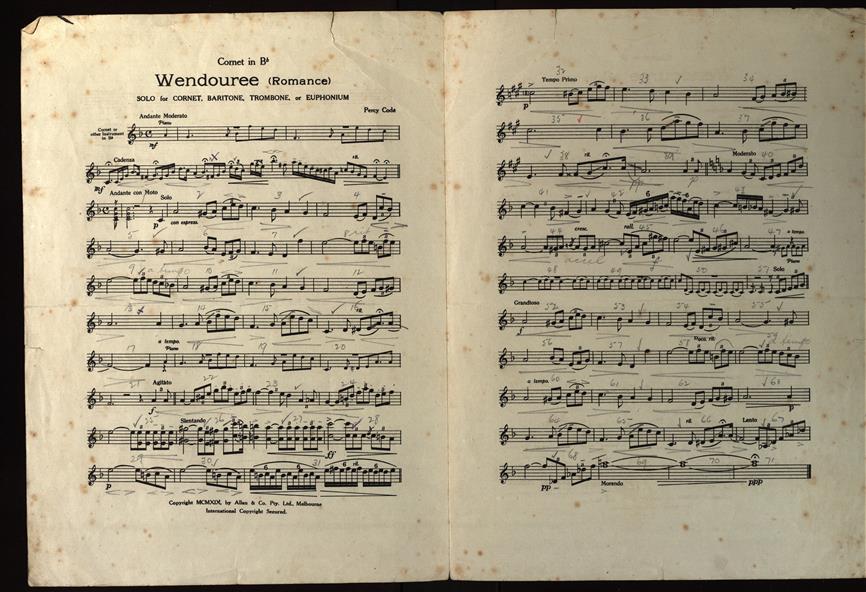
His first cornet solo - Wendouree
Return home
With no further prospect of employment he returned home in 1912 where he made his competitive conducting debut leading Warrnambool Band to victory at the important Ballarat Contest – beating the home favourites City of Ballarat Band conducted by his father, into second place.
It was said that far from being disappointed, his proud father soon handed over the baton to his son. It was an appointment that was to last a decade of further success.
In March 1921 he left Australia for the USA where he was immediately engaged as second trumpet with the San Francisco Symphony Orchestra under Alfred Hertz. He later said that the salary was ‘three times’ anything he would have earned at home.
He married Elsie Miller in 1915 and soon his career expanded – adjudicating at the Australian and New Zealand National Championships in the same year (returning to New Zealand in 1925), and gaining both an Associate and Licentiate of the London College of Music – the later with a maximum 100 marks.
He also led the Ballarat Competitive Choir to the Choral Championship of Australia in 1920 and was a member of the Victorian Band League Music Advisory Board.
Three times the salary
In March 1921 he left Australia for the USA where he was immediately engaged as second trumpet with the San Francisco Symphony Orchestra under Alfred Hertz. He later said that the salary was ‘three times’ anything he would have earned at home.
He returned, as promised to his wife, in 1924 – leaving behind him the greatest opportunity he had to make a name for himself on the wider musical stage. A proposed second trip in 1926 was abandoned when Elsie was taken ill.
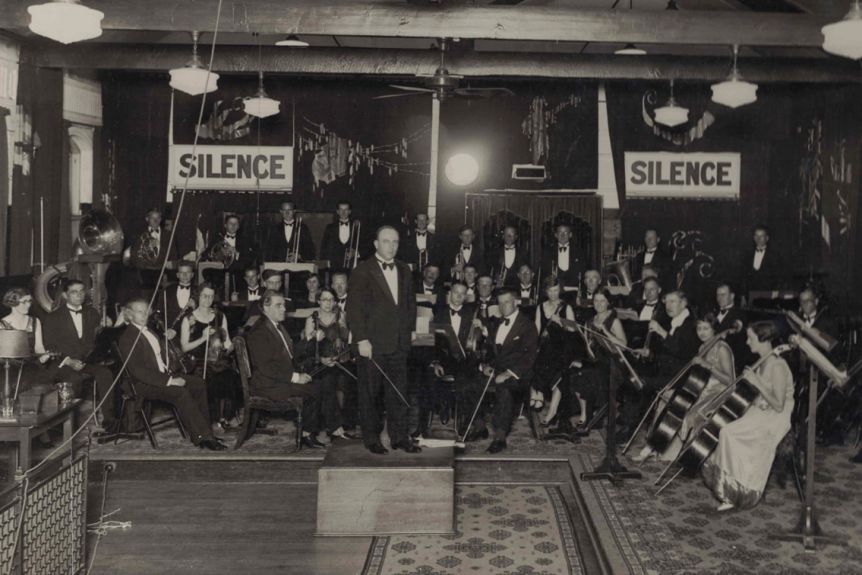
Leading the ABC Symphony Orchestra
Peak years
Fortunately, the establishment of the fledgling Australian Broadcasting Company Symphony Orchestra saw him appointed Musical Director (above) – staying as it became the much larger Australian Broadcasting Commission Orchestra in 1932.
Although the advent of the Second World War curtailed many performance opportunities, these were to become the peak years of his professional working life; also leading the Sydney Symphony Orchestra in broadcasts of opera and concerts programmes – including one with the famed Italian tenor Dino Borgioli.
Popular with his players, his rather serious, introvert nature brought him respect, even if there were occasional complaints about his conducting technique.
A fan of Elgar- his most notable and critically performance was of the symphonic study, ‘Falstaff’, in Sydney in 1941.
Lifelong interest
Despite moving away from the sphere of brass banding contesting, Code retained a lifelong interest – adding to his compact series of march compositions (which included one entitled ‘Besses’ and another ‘City of Ballarat’) with one entitled, ‘Our Jubilee’ written to mark the occasion of the 50th anniversary of the Bathurst Band in 1935 in honour of its conductor Sam Lewins. He travelled especially from Melbourne to hear it play.
Although his compositional output for solo instruments ended in 1934, the eleven works he wrote – from ‘Wendouree’ (1919) through to ‘Prelude de Concert’ (1934) retain a sense of structured craftsmanship, that although very much of their time, and of Code’s appreciation of lyrical melody (reminiscent of his teacher Alex Owen’s solo works), still hold stylistic interest to this day.
A devout Methodist with an equally regimented work ethic, Code composed the hymn ‘Divinity’ with words written by Ian Hyndman and prepared brass band arrangements of many well known hymns in series entitled ‘Sacred Masterpieces’ published in 1932 which made its way into almost every bandroom library in the antipodes .
He published Allan's ‘Modern Method for Cornet or Trumpet’ in 1936.
Structured craftsmanship
Although his compositional output for solo instruments ended in 1934, the eleven works he wrote – from ‘Wendouree’ (1919) through to ‘Prelude de Concert’ (1934) retain a sense of structured craftsmanship, that although very much of their time, and of Code’s appreciation of lyrical melody (reminiscent of his teacher Alex Owen’s solo works), still hold stylistic interest to this day.
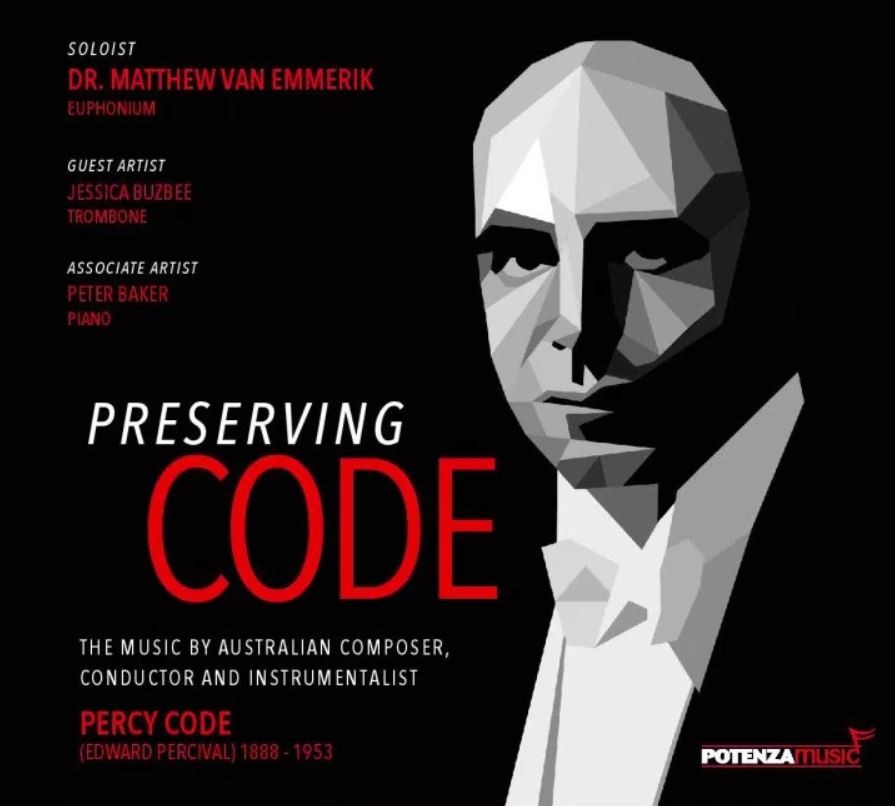
An outstanding homage
In 2017 the respected euphonium soloist and academic Dr Matthew Emmerik recorded them - including the addition of the sibling caprices of ‘Zelda’ (1923) and ‘Zanette’ (1925), ‘Miranda’ (1920), ‘Neath Austral Skies’ (1921), ‘At Dawn’ (1925), ‘At Sunset’ (1925), to ‘Lucille’ (1927), ‘The Emperor’ (1929) and ‘Valse Caprice’ (1933).
https://potenzamusic.com/product/preserving-code-cd/
Code’s nephew (he and Elsie did not have children and lived apart from around 1930), told the ABC News publication: “Even today cornet players from all over the world, they write to me now and again, have recorded those pieces and never been quite satisfied with their skills."
Ill health
In April 1947 Percy Code moved from the demanding schedules of Sydney and the Australian Broadcasting Commission Orchestra, to become the resident conductor of the Melbourne Symphony Orchestra. However, increasingly dogged by Ill health he retired from the post in November 1951.
We wouldn't have some of the lineage and some of the people that have been performing in our orchestras or even in the amateur world that we do today without him.”
His final years were spent quietly in Melbourne. He died of cardiovascular disease on 16th October 1953 and was buried in Box Hill cemetery, leaving an estate was valued for probate at £11,333.
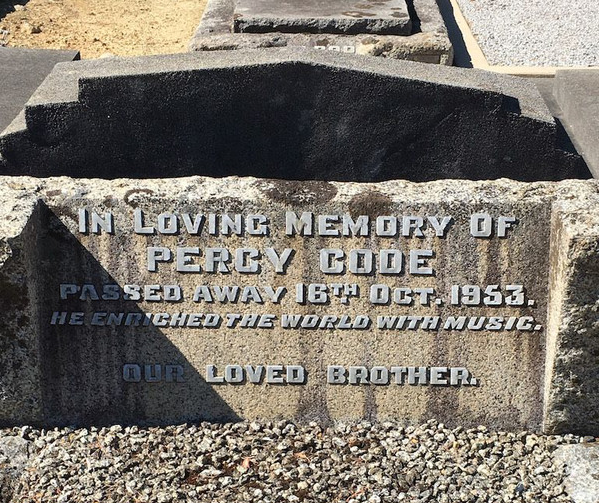
The final resting place
Accolade
In 1962 the Ballarat Contest paid Percy Code the accolade of a special section of competition in which players had to perform one of his works.
As Dr Matthew Emmerik, whose outstanding research and passion for Percy Code culminated in his outstanding 2017 project stated: “There has been a far reaching appreciation of Code's music in Australia for many years, and he remains something of an iconic figure.
We wouldn't have some of the lineage and some of the people that have been performing in our orchestras or even in the amateur world that we do today without him.”
That is a much more accurate reflection of a musician whose talent should be remembered for much more than one iconic solo work.
Tim Mutum
4BR Hall of Fame: No.1: Jack Atherton
https://www.4barsrest.com/articles/2019/1832.asp
4BR Hall of Fame: No.2: Albert Baile
https://www.4barsrest.com/articles/2019/1836.asp
4BR Hall of Fame: No.3: Stanley Boddington
https://www.4barsrest.com/articles/2019/1842.asp
4BR Hall of Fame: No.4: Bram Gay
https://www.4barsrest.com/articles/2020/1848.asp
4BR Hall of Fame: No.5: Leonard Lamb
https://www.4barsrest.com/articles/2020/1855.asp
4BR Hall of Fame: No.6: Arthur Stender
https://www.4barsrest.com/articles/2020/1866.asp
4BR Hall of Fame: No.7: Violet Brand
https://www.4barsrest.com/articles/2020/1871.asp
4BR Hall of Fame: No.8: Eric Bravington
https://www.4barsrest.com/articles/2020/1875.asp
4BR Hall of Fame: No.9: Norman Ashcroft
https://www.4barsrest.com/articles/2020/1879.asp
4BR Hall of Fame: No.10: Albert Chappell
https://www.4barsrest.com/articles/2020/1884.asp
4BR Hall of Fame: No.11: Betty Anderson
https://www.4barsrest.com/articles/2020/1889.asp
4BR Hall of Fame: No.12: Trevor Walmsley DFC
https://www.4barsrest.com/articles/2020/1897.asp













